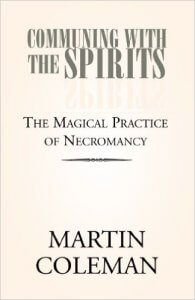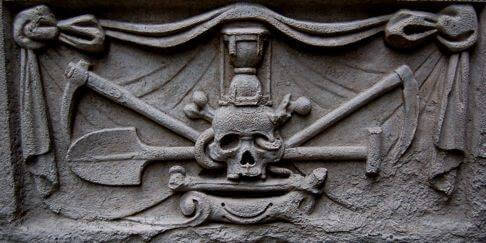 One of the big advantages of print-on-demand is that it opens up the field to practical magicians who are writing on subjects which are too daring for the commercial publishers, like working with spirits.
One of the big advantages of print-on-demand is that it opens up the field to practical magicians who are writing on subjects which are too daring for the commercial publishers, like working with spirits.
Martin Coleman’s Communing with the Spirits: The Magical Practice of Necromancy is a book written by a bloke who has a system and it works for him. It comes with all the useful advice you need to work his system and gives some interesting insights into the whole business of working with the dead.
I want to make this clear that this is not a field of interest for me. When I work with the dead and ancestor’s it is an adjunct to my other work. But it is fair to say that if I were going to specialise in necromantic work then I would take a similar approach.
Coleman starts the student working by invoking their ancestors and creating an altar. Then he moves onto a spirit of divination and then finally dead spirit. He warns you of the minimum time you are supposed to take on each stage and the challenges you are supposed to give each spirt to be sure that they are working correctly.
If Coleman is telling the truth his spirits are extremely effective and able to predict lottery numbers (amongst other skills).
If you were to follow a necromantic path this book has much to recommend it, however there are a few things that I didn’t like which need to be mentioned. The first thing is that there is an over whelming feeling of anti-intellectualism in the book. Coleman warns you that anything dead which tries to teach you any great occult philosophy is almost certainly a “trickster” spirit.
While there is some truth in this, and lots of people are suckered by spirits who spout bullshit, it is not true of all spirits. It would seem a pity if you summon the spirit of Agrippa into your flat to ask him to act as your debt collector (which is one of the exercises in this book). Coleman believes that you get physical instruction from a physical teacher while spirits get taught by spiritual teachers. I am not sure that is true. I know some people which get some good occult instruction from dead people… ok sometimes it has to be received with a pinch of salt but it is ok. I think the question here is quality and provability rather than a blanket ban.
Speaking of salt, Coleman has some very practical advice which also should not work. He is particularly worried about salt which he says dead spirits cannot go near. He suggests that it is important to put a grain of salt in your food so that the spirits don’t think it is an offering. But that is only in some traditions. The Roman spirits used to get rather a lot of salt as all offerings were sprinkled with the stuff. It did not seem to do them any harm at all, and some of the intact ancestor’s shrines in Rome still have their dead spirits attached to them.
But what I think, irked me the most about this book was the lack of a philosophy behind it. There were little explanations about what these spirits are and how they are like that. Coleman treats them in a similar way to the way people treat dogs. You train them with food and if they don’t do what they are told you abandon them on a street corner. This might be the necromancer way, but it cannot really work like that. Even if you accept the spirits are “shells” of the dead, they are still human. If someone asked you, look I want you to do this for me and I will give you a small portion of cold rice (without salt) you would tell them to go forth and multiply. Coleman sees them, at best, as children which is a little sad. If the afterlife is basically dead people squabbling over food they can’t actually eat, then the universe has got rather silly.
That said there is some very good advice about working with spirits which does not just apply to dead people and in some cases Coleman’s pragmatism is very useful.
For a number of reasons this makes this book important if you are working with any spirits. His observation on thought-forms gave me a useful insight how spirits work. Just be aware that it might be better at some points to come up with your own solutions.
· Paperback: 192 pages
· Publisher: Xlibris; 2 edition (March 10, 2005)
· Language: English
· ISBN-10: 1413484379
· ISBN-13: 978-1413484373
· Product Dimensions: 5.5 x 0.4 x 8.5 inches
